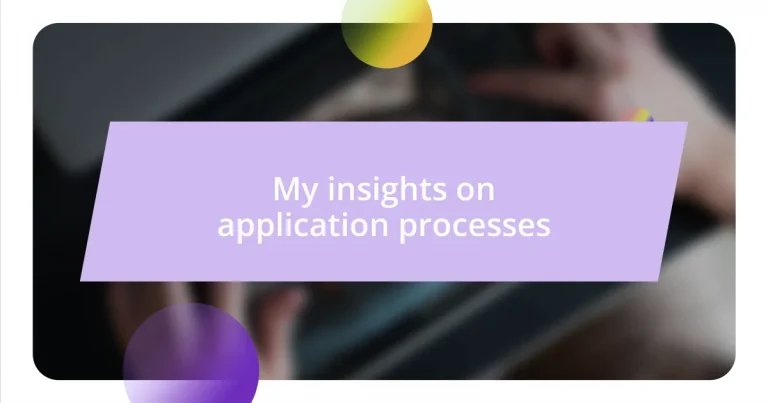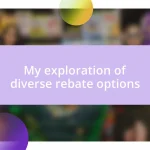Key takeaways:
- Understanding the unique elements of application processes, timelines, and personal storytelling can enhance your application strategy.
- Crafting a compelling personal statement requires authenticity, specificity, and relevance, supported by concrete experiences.
- Follow-up strategies, including timely and warm communication, can reinforce your interest and distinguish you from other candidates.
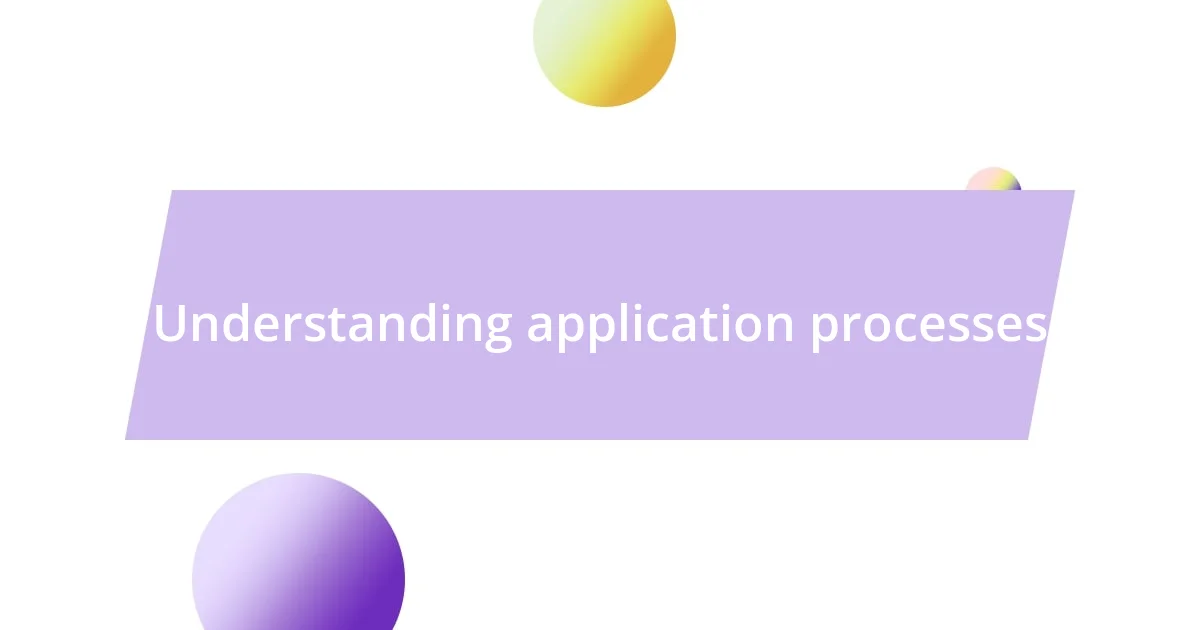
Understanding application processes
Understanding application processes can feel like navigating a maze. I remember the anticipation mixed with anxiety I felt when I submitted my first application—it was a mix of hope and fear, wondering if it would ever reach the right hands. Have you ever had that knot in your stomach while waiting for a response?
Each application process is unique, reflecting the values and priorities of the organization involved. It’s essential to examine not just what they ask for, but why they ask for it. For instance, when applying for a job that emphasized teamwork, I shared a story about a project where collaboration was key, allowing me to connect more with the hiring manager than mere bullet points ever could. This reflection on personal experiences can really set your application apart.
Moreover, understanding the timeline is crucial. I recall a time when I submitted an application well before the deadline, only to find out that early submissions were considered first. Did I strategize that? Not initially. But now, it’s become a part of my routine to track those timelines meticulously—it’s a game changer! Taking the time to understand all elements of the process can transform a daunting task into a more manageable and even strategic endeavor.
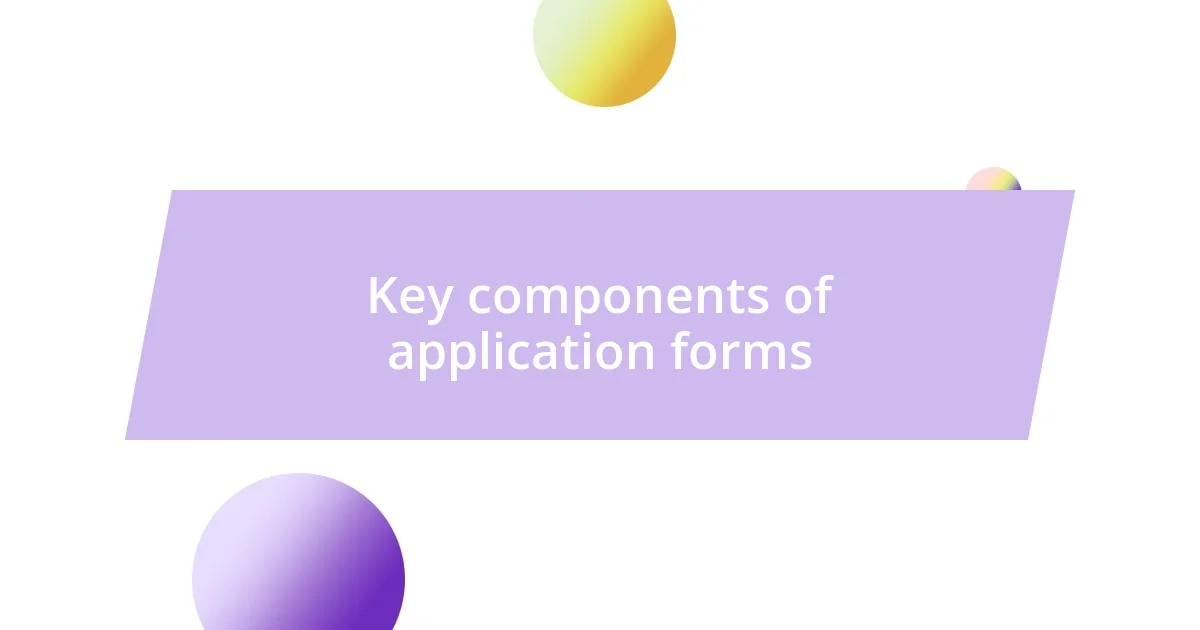
Key components of application forms
The key components of application forms usually include personal information, relevant experience, and specific qualifications. I’ve often found that the personal information section feels straightforward yet critical. It’s your opportunity to provide the basics—your name, contact details, and sometimes even demographics that can impact how your application is reviewed. But I’d encourage you to remember: this is just the starting point of your narrative.
When it comes to detailing your relevant experience, I believe that’s where most applicants falter. I vividly recall a time when I was applying for an internship and focused heavily on my academic achievements. While they mattered, the true game-changer was when I highlighted my volunteer work and how it taught me valuable skills. This emotional connection to the work made my application stand out. Don’t underestimate how sharing authentically can resonate with the reviewers.
Lastly, qualifications, whether academic or professional, often serve as the deciding factor in an application. The challenge is to present them in a way that makes the reader see you as the perfect fit. I once tailored my qualifications to mirror the language used in the job description. It felt a bit like speaking their language, which I think made a real difference. So, always strive for clarity and relevance.
| Component | Description |
|---|---|
| Personal Information | Basic details like name, contact info, and demographics. |
| Relevant Experience | Includes work history, volunteer activities, and personal anecdotes. |
| Qualifications | Academic and professional qualifications tailored to the application. |
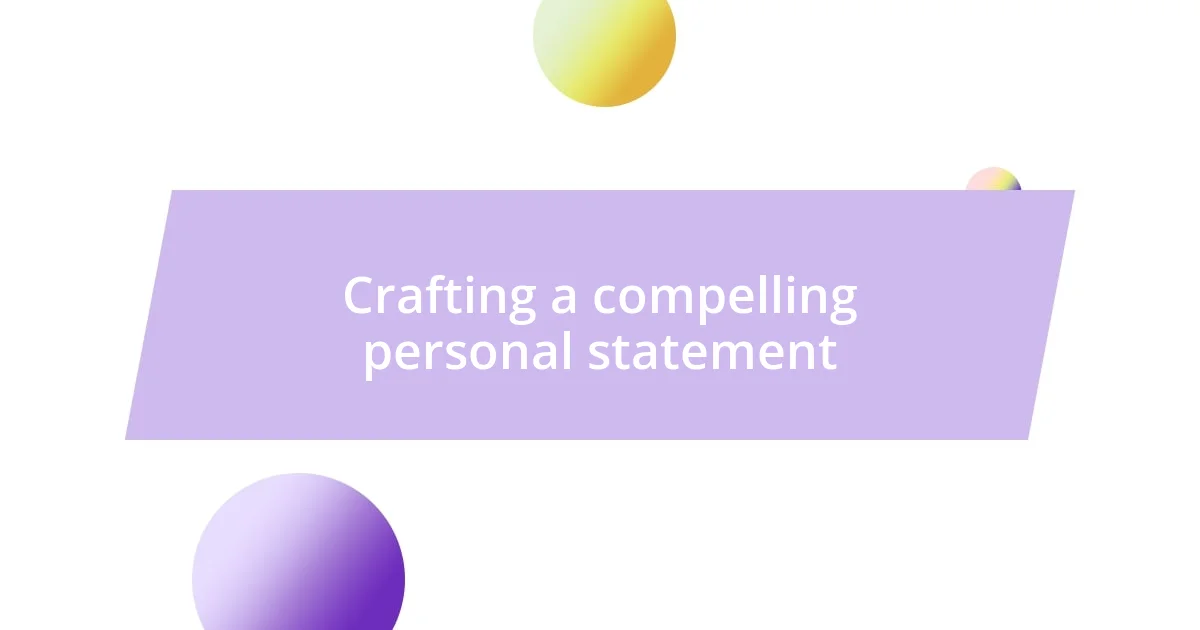
Crafting a compelling personal statement
Crafting a compelling personal statement is an art that requires introspection and clarity. I remember sitting in front of my laptop, pouring my heart into every word, desperate to convey my authenticity. It’s easy to get overwhelmed, but I found that reflecting on key moments in my life that shaped my ambitions made my statement profoundly engaging. Sharing a pivotal experience not only adds depth but also allows the reader to connect with your journey.
To make my personal statement truly shine, I focused on these essential elements:
- Authenticity: Be yourself. Genuine writing resonates more than trying to fit a mold.
- Narrative: Tell a story that reflects your passion and motivations—this makes you memorable.
- Specificity: Use concrete examples rather than vague statements. I recalled specific challenges I faced and how they influenced my growth.
- Relevance: Always tie your experiences back to the opportunity you’re applying for. This creates a clear connection that reviewers appreciate.
- Emotion: Don’t shy away from expressing feelings. I infused my statement with vulnerability, sharing moments of joy and determination.
By weaving together these aspects, I was able to craft a statement that felt both personal and powerful, like a heartfelt conversation you’d have with a close friend, making it stand out in a sea of applications.
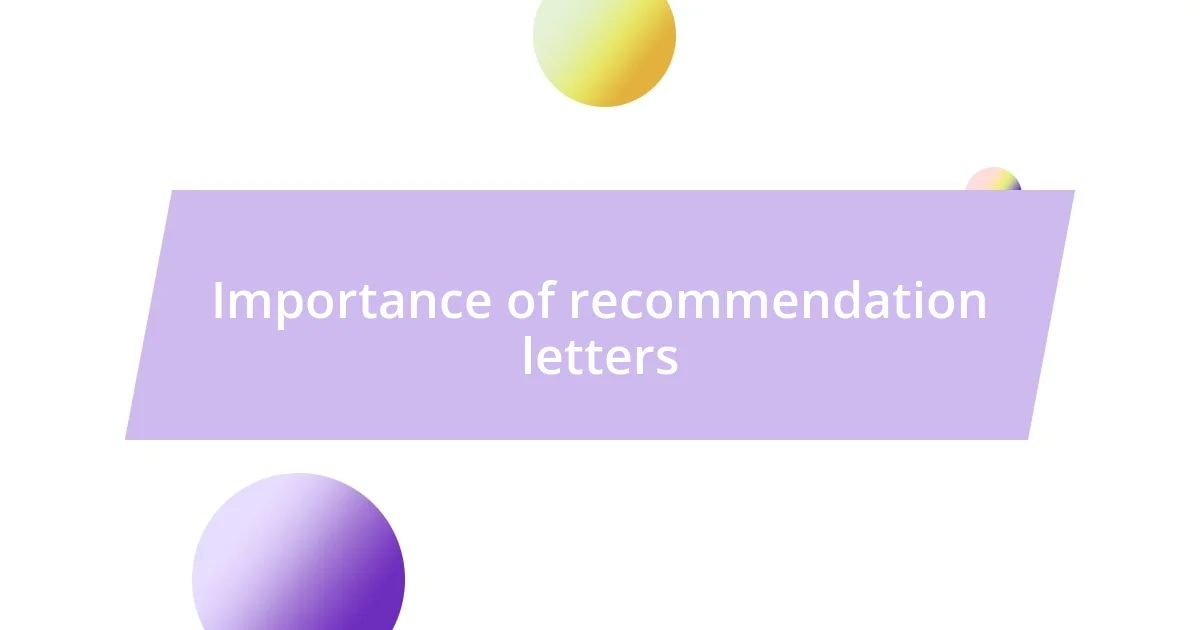
Importance of recommendation letters
Recommendation letters hold immense weight in the application process, acting as endorsements that add credibility to your narrative. When I was preparing my application for graduate school, I requested letters from mentors who understood my aspirations and were familiar with my progress. Their insights illuminated aspects of my character and potential that I hadn’t fully articulated in my application—this made all the difference.
Think about it: a well-crafted recommendation letter can provide context and depth to your achievements, transforming a mere list of qualifications into a story of growth and potential. I once read a letter that vividly highlighted not just my academic skills but also my resilience after overcoming setbacks. That level of detail enables the reviewers to picture you as a candidate who brings not just qualifications but also character to the table.
Moreover, recommendations can reveal your interpersonal skills, teamwork, and work ethic—traits that aren’t always evident on paper. When my recommender shared a specific instance where I led a team project successfully, I could almost feel the gratitude in their words. It reinforced my belief that your relationships and collaborations matter as much as your individual accomplishments. Isn’t it reassuring to know that someone else can illuminate your strengths in ways you might not even recognize?
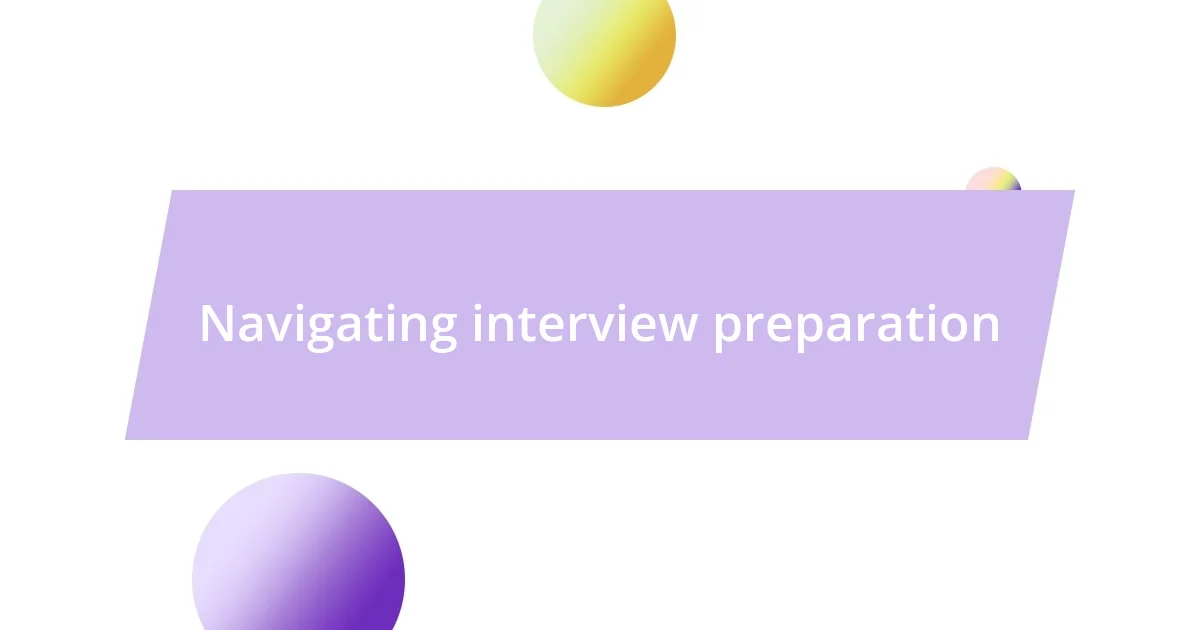
Navigating interview preparation
Navigating interview preparation can feel like gearing up for a high-stakes performance. I remember the nerves bubbling in my stomach before my first major interview. It was important for me to shift that energy into something productive, so I developed a routine that included researching the company deeply and practicing common interview questions with a friend. That extra layer of preparedness made a world of difference, turning those nerves into excitement.
Another strategy I found invaluable was to visualize myself during the interview—how I would answer questions, engage with the interviewer, and convey my experiences. This method not only calmed my nerves but also helped me project confidence. I learned that imagining success can serve as a powerful motivator. Can you recall a situation where visualization played a role in your accomplishments? It’s fascinating how our minds can shape our reality.
Finally, don’t underestimate the importance of self-reflection after a practice interview. I often recorded my sessions, reviewing them to fine-tune my responses and body language. I still remember the moment I realized I was fidgeting too much during answers. Making those small adjustments not only improved my delivery but boosted my self-awareness significantly. It’s these details that often set successful candidates apart—little tweaks that lead to big results.
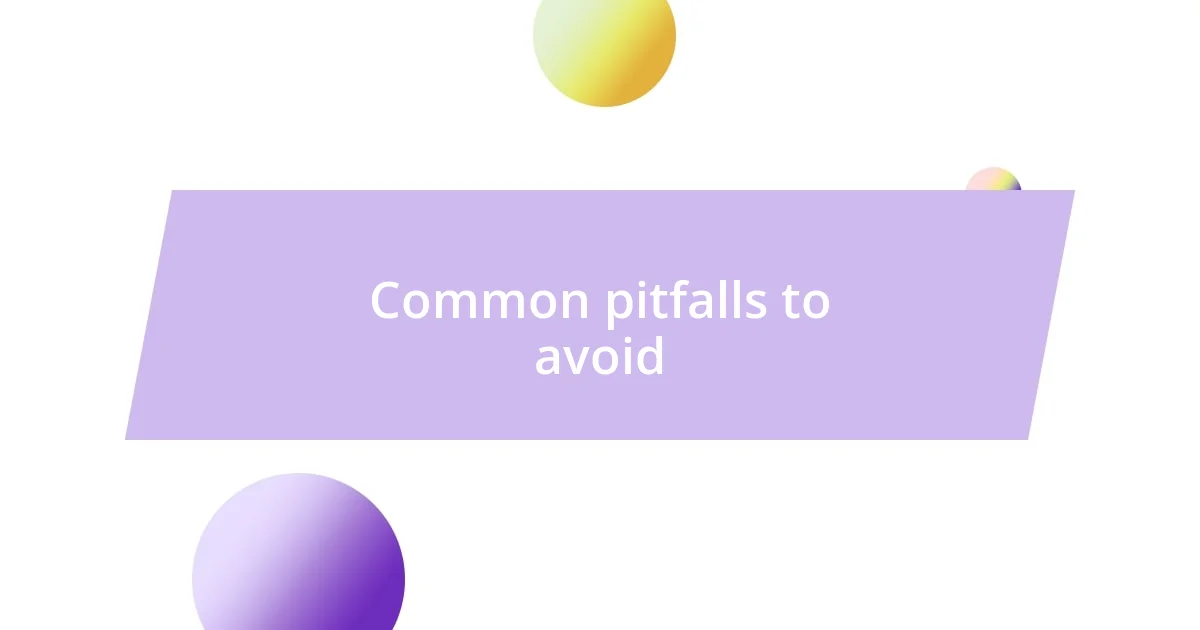
Common pitfalls to avoid
One common pitfall I encountered during my application journey was the tendency to overlook the importance of tailoring my materials to each opportunity. I think many applicants underestimate how a personalized approach can make a huge impact. I remember submitting a generic essay that didn’t resonate with the specific values of the program, and, to be honest, I felt like it fell flat. Crafting dedicated responses not only showcases genuine interest but also reflects how well you understand the institution’s unique offerings. Have you ever sent out an application only to realize you hadn’t fully connected with the target audience? It can be a missed chance.
Another mistake I often see is neglecting the proofreading phase. Early in my application process, I submitted a statement with a glaring typo that made me cringe upon reflection. It’s easy to feel rushed and dismiss this step, but even small errors can tarnish an otherwise stellar application. In high-stakes moments like these, each detail matters. I would urge you to seek feedback from trusted peers or mentors who can provide clarity and catch mistakes you might overlook. Wouldn’t it be reassuring to know your application is polished and professional?
Lastly, I’ve learned that overthinking can be detrimental—believe me, I’ve been there. I remember spending so long fretting about every word in my personal statement that I almost lost sight of my authentic voice. Free expression can sometimes take a back seat to perfectionism, but it’s essential to let your true self shine through. Think about how you can show your individuality while still maintaining professionalism. It’s that balance that can ultimately set you apart from other candidates. Have you ever felt like you were editing yourself too much? Finding that sweet spot often means embracing both your strengths and your quirks.
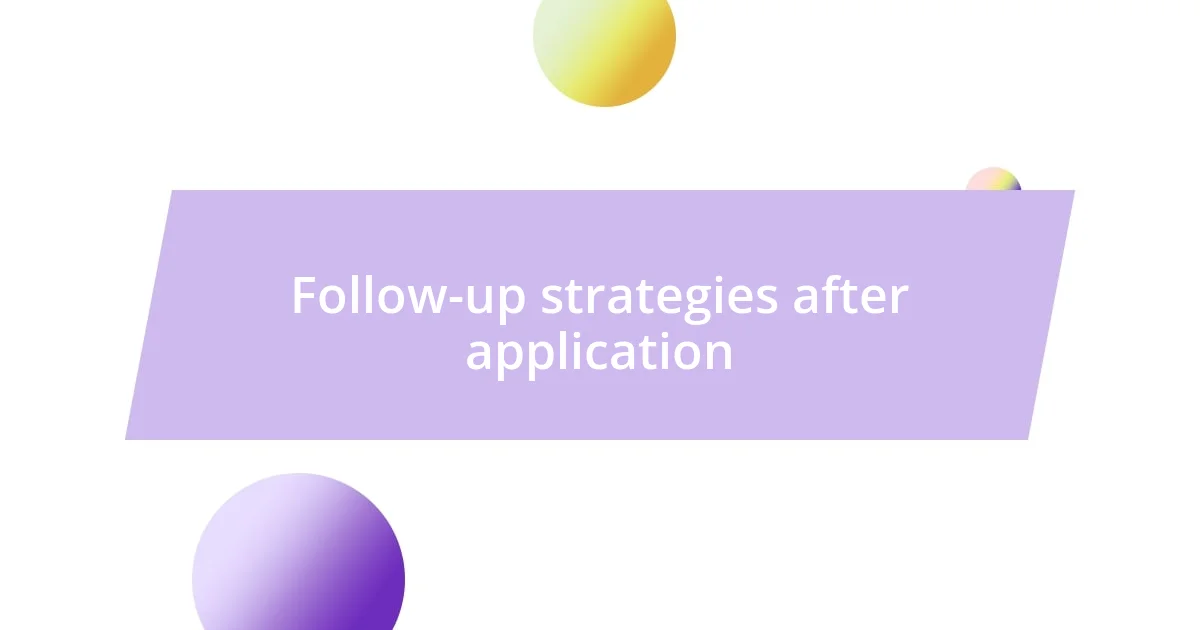
Follow-up strategies after application
Following up after submitting an application can be a crucial step in showcasing your continued interest in the position. I remember sending off an application with high hopes and then wondering about the next steps. So, I decided to send a polite email about a week later, expressing my enthusiasm and inquiring about the timeline for decisions. This simple gesture not only reaffirmed my interest but also kept my name fresh in the hiring manager’s mind. Have you considered how a well-timed follow-up could distinguish you from other candidates?
Timing can make all the difference. From my experience, I found that sending a follow-up too soon can come off as pushy, but waiting too long might let your application fade from memory. Ideally, giving it a week or two strikes a nice balance. I recall following up on an application after ten days, and it led to a friendly conversation with the recruiter. They appreciated the initiative, and it gave me valuable insights into the application process. How would you feel if a simple follow-up could turn an average application into a memorable one?
Moreover, the tone you choose in your follow-up can set the stage for future interactions. I learned that being warm and authentic in my emails goes a long way. One time, I shared a personal connection with the company’s mission during my follow-up, which sparked a positive response. It felt genuine and fostered a sense of rapport. Have you thought about how sharing your story could resonate with the person reviewing your application? Finding that connection can elevate your candidacy beyond just being another name on a list.












